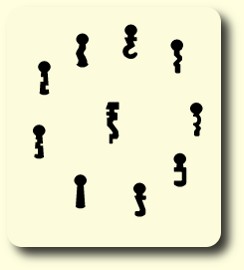Μας αρέσει η αντικειμενικότητα, εμάς των ανθρώπων. Ψάχνουμε για απόλυτες αλήθειες στα πάντα. Χιλιάδες επιστήμονες και παπάδες θα προστίθονταν στα ήδη τεράστια πλήθη των ανέργων ανά την υφήλιο αν οι άνθρωποι μπορούσαν να συλλάβουν έστω για λίγο πόσο εγκλωβισμένοι είμαστε ο καθένας στον δικό του μικρόκόσμο.
Αυτή την αντικειμενικότητα μας αρέσει να την εξασκούμε και στην εξωτερική εμφάνιση των άλλων ανθρώπων. Όταν περιγράφουμε κάποιον ή κάποια και την εμφάνιση τους, την σχολιάζουμε με την σιγουριά που θα δείχναμε αν αφήναμε μια τσαγιέρα να κάνει ελεύθερη πτώση από την κορυφή μιας πολυκατοικίας : είναι όμορφη. Είναι άσχημος. Η επιτάχυνση της βαρύτητας στην Γη είναι 10 μέτρα ανα σεκόντ τετράγωνο. Η διαφορά αυτών των δύο είναι πως, στην μία περίπτωση, αν υπάρχει διαφωνία πρέπει να συνοδεύεται από τις αντίστοιχες αποδείξεις για να φέρει την επιστημονική επανάσταση, ενώ κάτι τέτοιο δεν είναι απαραίτητο για να διαφωνήσεις με τον κολλητό σου που μόλις επιδοκίμασε τα οπίσθια της μπροστινής αλλά εσύ μπορείς να δεις ξεκάθαρα την επίδραση της προαναφερθείσας επιτάχυνσης πάνω τους. Δεν θα δεχτεί όμως την άποψη σου γιατί «έχει κωλάρα, όπως και να το κάνουμε».
Η ύπαρξη του προσωπικού γούστου και ό,τι αυτό συνεπάγεται φαίνεται να μην ενδιαφέρει καθόλου τους περισσότερους μας. Αν κάποιος είναι «αντικειμενικά όμορφος» (αχ πόσες φορές το έχω ακούσει αυτό) δεν θα έπρεπε να αρέσει σε όλες; Αν η ασχήμια είναι μια παγκόσμια σταθερά, δεν θα έπρεπε μέχρι τώρα να έχουν εξαφανιστεί οι άσχημοι άνθρωποι επειδή πολύ απλά ποτέ δεν θα αναπαράγονταν και δεν θα μπορούσαν να διαιωνίσουν τα γονίδια τους; «Πφφφ, Κιούμπι, απλά μερικοί άνθρωποι έχουν περίεργα γούστα». Αλήθεια; Ποια γούστα είναι περίεργα λοιπόν; Όχι τίποτα άλλο, για να μπορώ να πω κάποια στιγμή στο μέλλον “I digged fat chicks before it was cool”.
Το να σου αρέσει ή όχι κάποιος/α είναι μια δράση που χρειάζεται πομπό και δέκτη. Κανείς δεν μπορεί να είναι όμορφος αν δεν υπάρχει κανείς άλλος να τον δει (κάτι σαν το δέντρο που πέφτει στο δάσος και κανείς δεν είναι εκεί για να το ακούσει). Η εξωτερική εμφάνιση είναι σημαντική επειδή είναι ένα μέσο κριτήριο διαλογής μεταξύ των ανθρώπων. Κατα συνέπεια είναι σχετική, χρειάζεται (τουλάχιστον) δύο και αλλάζει με τις περιστάσεις. Λέγοντας ότι κάποιος είναι όμορφος δεν μιλάς για εκείνον, δεν μπορείς να μιλήσεις αντικειμενικά για την εμφάνιση του, είναι κάτι το πρακτικά αδύνατο αφού οποιοσδήποτε άλλος θα την κρίνει με διαφορετικά κριτήρια από εμάς και έτσι θα υπάρχουν αναπόφευκτα διαφωνίες σχετικά με την εμφάνιση — εφάμιλλες διαφωνίες με το «ποιο μουσικό συγκρότημα είναι το “καλύτερο”», «γάτα ή σκύλος», «βουνό ή θάλασσα», «Ντάγκλας Άνταμς ή Τέρι Πράτσετ» . Όταν προσπαθούμε να «αντικειμενοποιήσουμε» τον κόσμο χάριν ευκολίας και τάξεως, το μόνο που κάνουμε είναι να γενικεύουμε, να απλοποιούμε τον κόσμο, να τον κόβουμε και να τον ράβουμε στα μέτρα μας και να απαιτούμε όλοι να συμφωνούν — γιατί αν δεν υπάρχει συμφωνία, δεν υπάρχει αντικειμενικότητα. Λέγοντας ότι κάποιος είναι όμορφος, το μόνο που είναι δυνατόν να εννοούμε είναι ότι μας αρέσει η εμφάνιση του, ότι είναι του γούστου μας.
«Γκουχ, αυτά τα δύο δεν είναι το ίδιο πράγμα;» ΌΧΙ! Λέγοντας ότι κάποιος είναι άσχημος περιγράφεις τον άλλον με ένα εξ ορισμού υποκειμενικό επίθετο. Αν πεις ότι τον βρίσκεις άσχημο περιγράφεις τον εαυτό σου. Αυτός ο διαχωρισμός είναι πάρα πολύ σημαντικός γιατί αναδεικνύει την σημαντικότητα του γούστου.
Ας πάρουμε ένα άλλο παράδειγμα. Έχετε σκεφτεί ποτέ γιατί σας αρέσουν τα φαγητά που προτιμάτε; Γιατί δεν σας αρέσει το κουνουπούδι; Αν λέγατε ότι το κουνουπίδι είναι άνοστο, ευθυς αμέσως θα είχατε μια ορδή αιμοδιψών χυμοδιψών χορτοφάγων που θα επέμεναν ότι το κουνουπίδι είναι θείο δώρο για τις σαρκικές απολαύσεις και ότι τους. Ποιος έχει δίκιο λοιπόν; Και οι δύο; Κανείς; Κόντρες βασισμένες σε γούστα δεν θα λυθούν ποτέ. Είναι ο τετραγωνισμός του κύκλου των ανθρώπινων σχέσεων. Πώς μπορείς ποτέ να πείσεις ή να πειστείς από κάποιον που αγαπάει αυτό που μισείς και μισείς αυτό που αγαπάει, ειδικά όταν δεν ξέρεις γιατί το μισείς ή το αγαπάς; (το γούστο δεν συνδέεται καθόλου με την λογική, παρά με το συναίσθημα)
Όπως το περιβάλλον μας (οικογενειακό, φιλικό, επικοινωνιακό, πολιτισμικό) διαμορφώνει τις εμπειρίες και κατα προέκταση την προσωπικότητα μας, έτσι διαμορφώνει το γούστο και τις προτιμήσεις μας με τρόπους που εμείς δεν μπορούμε να κατανοήσουμε ή να θυμηθούμε. Δημιουργεί τα αισθητικά μας κριτήρια και τα πρότυπα ομορφιάς τα οποία ακολουθούμε και ψάχνουμε στους άλλους.
«Έλεος! Θα μας τρελάνεις! Δηλαδή δεν υπάρχουν κάποια ελάχιστα κοινώς αποδεκτά αισθητικά κριτήρια; Δεν υπάρχουν αντιαισθητικά πρόσωπα, στραβά πόδια, κρεμασμένες κοιλιές, λαδωμένα μαλλιά, κίτρινα δόντια;» Όπως κάθε κοινωνία έχει την κουλτούρα της, την γλώσσα της, τους άγραφους κοινωνικούς κανόνες της και τα ταμπού της, έτσι, ως μέρος της γενικότερης κουλτούρας της, διατηρεί και κάποια αισθητικά πρότυπα τα οποία είναι τελείως αυθαίρετα. Στην εποχή μας η εικόνα είναι παντοδύναμη και έχει απόλυτο ρόλο στην δημιουργία των προτύπων. Απλά σκεφτείτε, π.χ. πως εσείς, ή τα τωρινά παιδιά, είναι μεγαλωμένα από την τηλεόραση ή το ίντερνετ. Σκεφτείτε τι κεντρικό ρόλο είχαν και έχουν τα μέσα, με κύριο σκοπό την διαφήμιση και επομένως το κέρδος, στην δημιουργία των πλατωνικών ιδεών της κοινωνίας μας. Οι κοινωνίες όχι μόνο αναπαράγουν αυτές τις ιδέες από γενιά σε γενιά κι έτσι είναι αδύνατο να βρούμε τις απαρχές ενός προτύπου (δεν μπορούμε να ξέρουμε πότε ακριβώς εμφανίστηε η ιδέα ότι η τρίχες στις γυναίκες είναι αντιαισθητικές, για παράδειγμα), αλλά τώρα, εφόσον είναι παγκοσμιοποίημενες, οι κοινωνίες ως συστήματα μπλέκονται, επηρεάζοντας ανθρωπολογικά και κοινωνιολογικά η μια την άλλη, δημιουργώντας πρότυπα σουφλέ τα οποία ελέγχονται και διαιωνίζονται από τα παγκόσμια μέσα και όχι κατ’ανάγκην εκ προθέσεως. Δηλαδή, εκεί που είχαμε μια παγκόσμια παλέτα χρωμάτων και προτιμήσεων τώρα μεγάλο μέρος του κόσμου είναι μια απόχρωση του γκρι, στην καλύτερη ό,τι θα παίρναμε από ένα χρώμα αν του μειώναμε τον κορεσμό στο Photoshop. Και αφού το γκρι είναι το μόνο που πολλοί άνθρωποι ποτέ έμαθαν στην ζωή τους, το γκρι είναι αυτό που θα μάθουν και στα παιδιά τους. Και το γκρι θα είναι το πρότυπο.
Τα γούστα κάθε ανθρώπου είναι σαν μια κλειδαρότρυπα με πολύ συγκεκριμένο σχήμα. Άλλες οντότητες του κόσμου, είτε αυτές είναι άψυχες είτε έμψυχες, συγκρίνονται προσωπικά και εξατομικευμένα με το κατά πόσον μπορούν να χωρέσουν σε αυτή την κλειδαρότρυπα. Δεν υπάρχουν πασπαρτού στον κόσμο των γούστων, και όσο περισσότεροι άνθρωποι το καταλάβουν αυτό τόσο λιγότερες διαφωνίες και πόνο μπορούμε να γλιτώσουμε. Αν εμένα λοιπόν μου αρέσει ή δεν μου αρέσει κάποιος ή κάτι, δεν είναι δική του η ευθήνη αλλά της δικής μου κλειδαρότρυπας.
Την επόμενη φορά που κάποιος θα εκφέρει άποψη για την εμφάνιση σας, αναλογιστείτε γιατί έχει αυτή την άποψη. Δείτε τα πράγματα σφαιρικά. Δείτε ότι για κάποιους λόγους είστε το κλειδί για την κλειδαρότρυπα του/της, ή, στην αντίθετη περίπτωση, το… χμ… δύσκολο να το ενοραματιστούμε το αντίθετο του σωστού κλειδιού με την συγκεκριμένη αναλογία των κλειδιών και των κλειδαρότρυπων. Ας πούμε απλά, ότι αν κάποιος σας βρίσκει άσχημο/η, εσείς είστε έτσι:

Και το γούστο τους είναι έτσι:

Ακόμα κι αν είστε κλειδί πασπαρτού — δηλαδή ταιριάζετε με τα πρότυπα ομορφιάς και αρέσετε σε πολλούς/ες… τα κλειδιά πασπαρτού δεν μπορούν να ανοίξουν μερικές κλειδαριές. Δεν θα πω ότι δεν μπορούν να ανοίξουν τις πιο εξειδικευμένες για να μην φανώ ελιτιστής.
Τέλος, η ιδέα της κοινωνικής πόλωσης λέει πως, ό,τι κι αν κάνουμε, όπως και να ντυθούμε, ό,τι και να πούμε, όποιες κι αν είναι οι απόψεις μας και όπως κι αν μοιάζουμε σε κάποιους θα αρέσουμε και σε κάποιους όχι. Ακόμα κι αν προσπαθούμε να γίνουμε, ακόμα κι αν είμαστε πασπαρτού, μόνο αν εξασκήσουμε την διαφορετικότητα μας θα μπορέσουμε να φτάσουμε στην κλειδαριά στην οποία θα ταιριάζουμε με το φυσικό μας σχήμα απόλυτα. Γιατί, ω γιατί να προσπαθήσουμε λοιπόν, να είμαστε κάτι διαφορετικό;
“Me gusta”, “es bonita” no.

 John Dies at the End by David Wong
John Dies at the End by David Wong







